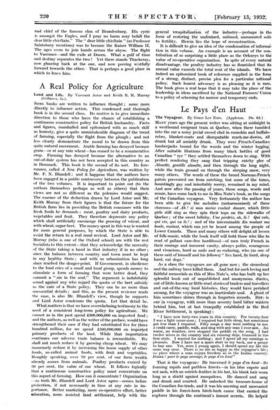A Real Policy for Agriculture
Land and Life. By. Viscount Astor and Keith B. H. Murray (Gollancx, 5s.).
SOME books are written to influence thought ; some more directly to influence action. This condensed and thorough book is in the second class. Its motive is to give immediate direction to those who have the chance of establishing a continuous constructive policy for British husbandry. Facts and figures, marshalled and epitomized with as much skill as honesty, give. a quite unmistakeable diagram of the trend of farming, especially the flight from the plough ; and not less clearly demonstrate the moral to be drawn from this quite natural movement. Arable farming has decayed because grain—or at any rate wheat—has ceased to be a remunerative crop. Farming has decayed because the alternative to an out-of-date system has not been accepted in this country as in Denmark. This book is the second of its sort. Its fore- runner, called A New Policy for Agriculture, was written by Mr. F. N. Blundell ; and it happens that the authors have been engaged in a public controversy between the publication of the two volumes. It is important to point out (to the authors themselves perhaps as well as others) that their views are not so different as the polemics would suggest. The essence of the deduction drawn by Lord Astor and Mr. Keith Murray from their figures is that the future for the British farm lies in providing the British consumer with the fresh foods he demands : meat, poultry and dairy products, vegetables and fruit. They therefore deprecate any policy which shall artificially encourage the growing of wheat, and with wheat, sugar-beet. The money spent in this way is wanted for more general purposes, by which the State is able to assist. the return to a real rural revival. Lord Astor. and Mr. Murray (who is one of the Oxford school) are with the rest Socialists to this extent—that they acknowledge the necessity of the State taking a hand in that industry if in no other ; since. the, balance .between country and town must be kept in any healthy State ; and with us urbanization has long since reached the danger-point. If Government, in obedience to the loud cries of a small and local group, spends money to stimulate a form of farming that were better dead, they commit a "sin in the soul.", The argument is indubitably soand againstany Who regard the quota or the heit subsidy as the core of a State policy. They can be no more than unessential details ; and this, as the present reviewer reads the case, is also Mr. Blundell's :View, though he supports and Lord Astor condemns the 'quota. Let that detail be.
What..matters is that we have overwhelming testimony to the need of a consistent long-term policy for agriculture.: . We cannot as in the past. spend £300,000,000 on-imported food ; and the authors, as well as the writer of the preface, would have strengthened their case if they had substituted five for three hundred million, for we spend r.508000,000 on imported primary, products of the land. While that importation continues our adverse trade balance is irremediable. . We shall not much, reduce it by growing cheap wheat. We may immensely reduce it by increasing the home supply of other foods, so-called animal foods, with fruit and vegetables. Roughly speaking, over 70 per cent. of our farm wealth already comes from animals. Poultry products exceed -by 50 per. cent. the value of our wheat. It follows logically that a continuous constructive policy must concentrate on this aspect of farming. How can it concentrate ? Organization
—as both Mr. Blundell and Lord Astor agree—comes .before protection, if not necessarily in time at any rate in im- portance. Better marketing, more co-operative effort, better education, more assisted land settlenient,. help with the general recapitalization of the industry—perhaps in the fornri of restoring the undrained, unlimed, unmanured soils to fertility. Herein lies the hope of reconstruction.
It is difficult to give an idea of the condensation of informal tion in this volume. An example is 'an account of the eon. tribution of so surprising a' little place as the Orkneys to the value of co-operative organization. In spite of every natural disadvantage, the poultry industry has so flourished that its annual value exceeds the total rent of the islands. We have indeed an epitomized book of reference supplied in the form of a strong, distinct, precise plea for a particular ntftional policy. Such honest advocacy is as pleasing as it is rare. The book gives a real hope that it may take the place of the leadership in ideas sacrificed by the National Farmers' Union to a policy of scheming for narrow and temporary ends.






































 Previous page
Previous page